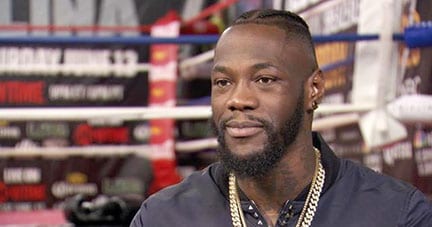Until a few days ago it’s doubtful anyone except the most hardcore boxing fan had any idea  who Deontay Wilder was, or that he has been the reigning WBC heavyweight champion for the past four years. Wilder has an impressive record, entered Saturday night’s title fight against Dominic Breazeale undefeated, and
who Deontay Wilder was, or that he has been the reigning WBC heavyweight champion for the past four years. Wilder has an impressive record, entered Saturday night’s title fight against Dominic Breazeale undefeated, and
had ended a record drought for Americans to hold any heavyweight crown when he initially won his title in 2015. He stopped Breazeale in the first round with a pair of devastating right hands, the second of which knocked his challenger not just down, but literally out for several minutes. The fight officially ended at the two minute and 17 second mark.
But well before the fight, which drew a crowd of almost 14,000 to Brooklyn’s Barclays Center, Wilder was all over the news for another reason, one that made the WBC head honchos upset and nervous, and drew condemnation from all over the sports world. Wilder talked about how boxing was the only sport where someone could legally kill an opponent in the ring, and that he was definitely going to make Breazeale pay for alleged past misdeeds and comments. The two had been feuding since 2017, when Breazeale had been on the undercard for a Wilder fight and their respective teams had later clashed at the hotel.
When the fight ended, everything seemed fine. “I just told Breazeale I love him, and of course, I want to see him go home to his family,” Wilder told ESPN afterwards. “I know we say some things, but when you can fight a man and then you can hug and kiss him, I wish the world was like that. We shake hands, and we live to see another day, and that’s what it’s all about.”
The problem is while people who know boxing understood that Wilder was engaging in pre-fight hyperbole to drive up the live gate, in this era of heightened concern over violence as a whole, and concussions in particular, boxing is already under a microscope. Despite its nickname as the “sweet science,” there is an inherent brutality involved when big men, especially those who are heavweights, slug it out in a ring for 12 rounds. Granted, there have only been a couple of times in boxing history anyone has ever been killed, but the object of the sport is to literally knock out your opponent, either to the point they can’t physically answer the bell, or they are counted out on the canvas.
Few people, even those who truly love boxing, are completely comfortable with this element of it. It’s very similar to football fans who enjoy the contact, but aren’t comfortable with the toll it takes on those who play it long term, or hockey fans who want fighting to remain in the NH, but aren’t too happy with seeing someone beaten and lying prone on the ice when they lose a fight. It can and often is dismissed as a necessary evil, but it really makes folks very nervous when it seems someone is embracing the uglier sides of a sport solely for publicity.
Wilder’s a terrific champion, someone boxing really needs, His win Saturday night was his ninth consecutive title defense. That ties him on the all-time heavyweight championship list with Muhammad Ali (during his first reign), Joe Frazier, Mike Tyson (the first time) and Lennox Lewis (his second time). He’s looking ahead to a possible unification match against British three-belt holder Anthony Joshua, as well as a rematch with another British champion Tyson Fury. Those two battled to a split draw last December, despite the fact Wilder knocked Fury down twice. Either of those matches have the potential to make the kind of headlines that haven’t been seen in the heavyweight division since the Tyson days.
However, first Wilder has to understand you’ve got to be a bit more discerning in your public comments. Some might accurately call it being hypocritical not to stress or emphasize boxing’s brutal nature when pumping up your fights, but you can bet that between now and whenever Deontay Wilder’s next fight occurs, there will be plenty of advice and discussion regarding what is and isn’t appropriate pre-language.

